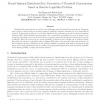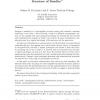154 search results - page 26 / 31 » Proving Group Protocols Secure Against Eavesdroppers |
110
click to vote
JUCS
2008
15 years 1 months ago
2008
Unknown Key-Share (UKS) resilience is a basic security attribute in authenticated key agreement protocols, whereby two entities A and B should not be able to be coerced into shari...
158
click to vote
ACNS
2003
Springer
15 years 6 months ago
2003
Springer
Distributed key generation is one of the most challenging tasks for threshold cryptosystems. Designing such a protocol and proving its security against a malicious, adaptive adver...
108
click to vote
JCS
2010
14 years 11 months ago
2010
raction of cryptographic operations by term algebras, called Dolev-Yao models, is essential in almost all tool-supported methods for proving security protocols. Recently significa...
129
click to vote
TCS
2002
15 years 28 days ago
2002
Suppose a principal in a cryptographic protocol creates and transmits a message containing a new value v, later receiving v back in a different cryptographic context. It can concl...
107
click to vote
SCN
2010
Springer
14 years 11 months ago
2010
Springer
An identity-based encryption (IBE) scheme can greatly reduce the complexity of sending encrypted messages. However, an IBE scheme necessarily requires a private-key generator (PKG)...


